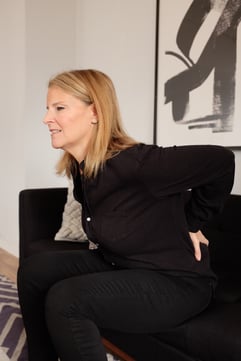“My back hurts” is a regular complaint that I hear from patients, and it sounds simple. Even before I attempt to diagnose the cause of the pain as structural, digestive, or emotional, it’s crucial that I understand how long you’ve been suffering and what you have done to try to help yourself. And if you haven’t done anything, I need to know why. Everyone can suffer from back pain - even great athletes struggle with back pain.

I have found that back pain sufferers fall into five different categories, distinguished by a patient’s feelings and beliefs about their backs and how they respond to pain. The categories allow me to properly understand the patient, determine the best approach, help the patient define his or her belief system about the pain, and change his or her perception.
Why do you need to change your perception? A patient’s beliefs about back pain are often a barrier to finding a permanent solution. Our medical society has created a belief that back pain is a natural progression of life and that everyone should learn to deal with the pain. The truth - there are treatment options that can help you, no matter what kind of back pain sufferer you are.
Back Pain Sufferer Assessment
My complete Back Pain Sufferer Assessment can be found in my book, 3 Weeks to A Better Back (or online - structural, digestive, or emotional). Listed below are some characteristics that may help you start to figure out what type of back pain sufferer you are, which allows me to go to work on fixing your belief system and your back:
The Quiet Manager – “A little pain is normal – everyone feels this way.”
- On a scale of 1 to 10, with 10 being the most severe and 0 being no pain, most days your back pain is between 1 and 3.
- You take Advil, Tylenol, or other OTC painkillers in anticipation of playing sports or being active.
- You haven’t sought professional care or treatment for your back.
I would categorize the majority of back pain sufferers as quiet mangers who don’t necessarily think they are suffering from back pain and won’t seek out any treatment for what they think are “normal” aches. They may simply associate pain with growing older and live around the limitations the back now imposes. Resigning yourself to believing the pain is “normal” is a mistake – your back can be fixed, and by listening to the small signs in your body and eliminating unhealthy habits, you can improve your back and overall health.
The Non-Traumatic Acute Sufferer – “My back went out. I will just load up on some Tylenol and it will go away. ”
- Your back pain doesn’t consistently bother you, but you have had bouts of pain that were higher than a 6 on a scale of 1 to 10, and these episodes lasted from a few days to two weeks.
- You bent over and your back went out.
- For women, the pain came on right around your menstrual cycle.
- You load up on pain relievers, whether they are over-the-counter or prescription, just to help deal with the immediate pain.
- Your stomach has recently been bothering you.
 If you fall into this category, you have pain caused by something non-impactful; for example, you weren’t hit by a car or something traumatic like that. The problem with this type of sufferer is that most medical practitioners give all acute-pain suffers a similar diagnoses (“It isn’t anything serious.”) and recommend a superficial treatment (“Try a few anti-inflammatory meds, maybe stretch a bit – you should be fine.”).
If you fall into this category, you have pain caused by something non-impactful; for example, you weren’t hit by a car or something traumatic like that. The problem with this type of sufferer is that most medical practitioners give all acute-pain suffers a similar diagnoses (“It isn’t anything serious.”) and recommend a superficial treatment (“Try a few anti-inflammatory meds, maybe stretch a bit – you should be fine.”).
Often the non-traumatic sufferer is a regular quiet sufferer. With the non-traumatic sufferer, it’s important to change the belief that the pain came out of nowhere. Through my wholistic approach to treating back pain I have learned that I can detect the true, original source of back pain, which could even be diet or stress, to help you find permanent relief.
The Chronic Sufferer – “I have back pain and I will just deal with it.”
- On a scale of 1 to 10, with 10 being the most severe and 0 being no pain, most days, your back pain is between 4 and 7.
- It is a rare occurrence if your back doesn’t bother you daily.
- You generally have a poor diet that may contain high levels of sugars, caffeine, or alcohol.
- You take pain medication (either prescription or over-the-counter) on a regular/frequent basis.
The chronic sufferer experiences “unmanageable” back pain for long periods of time, and believes he or she has to find a way to cope. You may be considering surgery, or have tried treatments, but those have not worked. The longer you have suffered, the more you believe it will never go away. But, if you are open to something new, there is still hope. Your suffering could be due not only to structural causes, but also have an emotional or digestive root.
The Life Sentence Sufferer – “There is nothing that can be done other than surgery. If that doesn’t help, I’m stuck in pain forever.”
- You have been diagnosed with spinal stenosis, degenerative disc disease, or arthritis.
- You have had surgery, but still have back pain.
- You have tried everything, but nothing has helped.
The main difference between the chronic sufferer and life-sentence sufferer is that the latter has been branded with a condition that becomes a prescription for lifetime suffering. These back pain patients tend to have the most stubborn belief system because you are convinced – even by your doctors – that you must suffer forever. I have news for you! Even if you’ve had pain for years, it doesn’t mean that you are stuck suffering for the rest of your life, and you can relieve pain.
The Traumatic Back Pain Sufferer – “That accident really messed me up and there is nothing else that can be done.”
- You have been involved in a motor vehicle accident.
- You were hurt playing sports.
- Your back pain started after a slip or fall, or another factor.
While I always like to consider the least invasive options first, surgery may be necessary for injuries. The less-invasive treatments, however, also need to be utilized to help you heal and recover. People who have been physically healed, but didn’t extinguish their digestive inflammation or emotional stress won’t heal properly.
Wholistic Back Health
Identifying the type of sufferer you are is essential to determining the correct cause of your pain. Most doctors are concerned with a specific part of the body that hurts, but different sufferers need different approaches. At most, you’ve explored 33% of the potential solutions, and likely only structural ones. While I would never attempt to tell you that I have helped everyone, all back pain sufferers deserve a chance to feel better. Listen to your body and identify what type of sufferer you are. Addressing the structural, emotional, and digestive issues will help get to the truth of your back pain.

